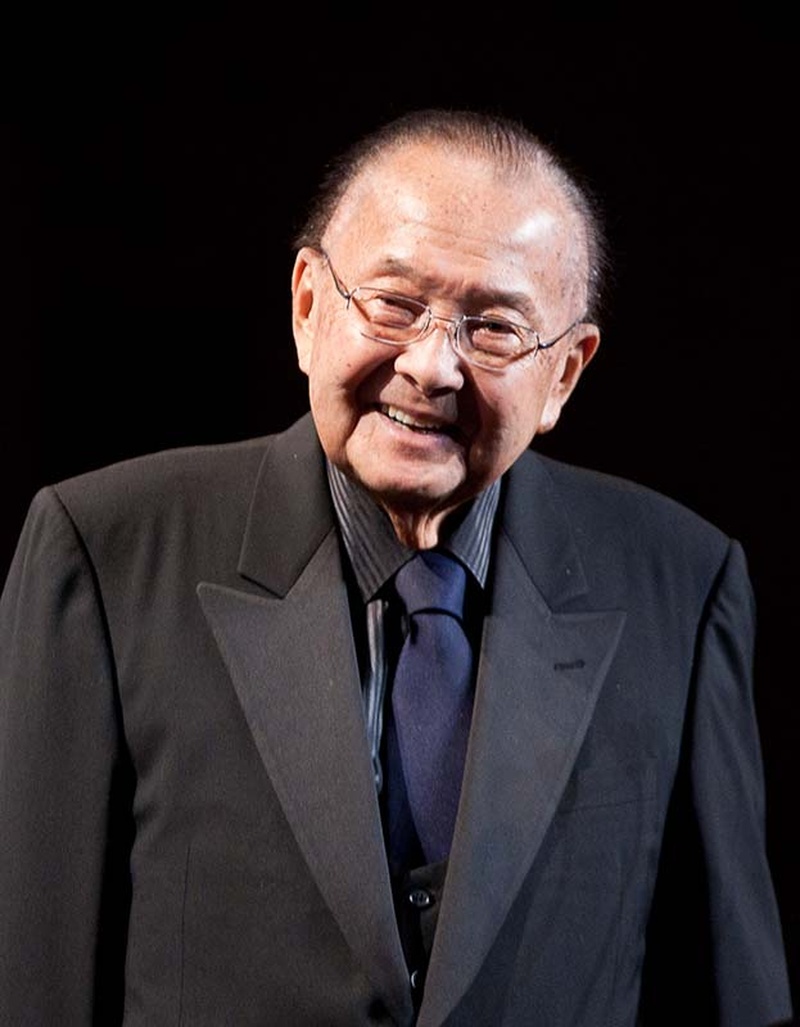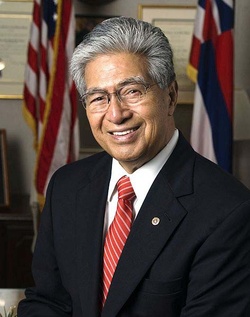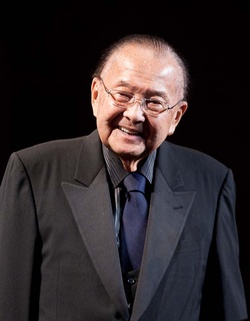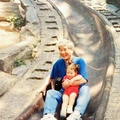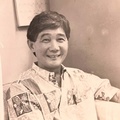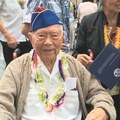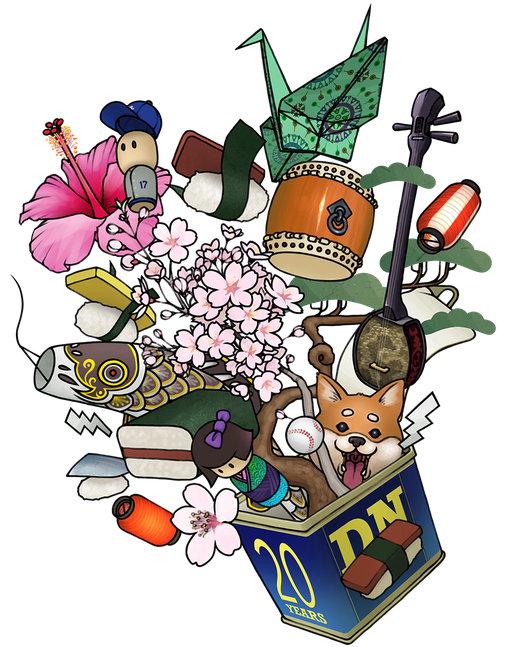This Dialogue was supposed to have been a tribute to Hawai‘i’s retiring U.S. Senator Daniel K. Akaka. Never could I have imagined that with heavy hearts we would be saying “Aloha ’oe…until we meet again…” to both of our United States senators at the same time—Sen. Akaka by virtue of his retirement from the U.S. Senate on Jan. 2, 2013, after nearly four decades in Congress, and to Sen. Daniel K. Inouye, who succumbed to complications from a respiratory ailment on December 17.
Our two Senator Dans were brothers under their skin—one native Hawaiian, the other a Hawai‘i-born Japanese American. I think of all they accomplished for Hawai‘i and sense the heavy burden that Senator-elect Mazie Hirono must be feeling as she prepares to take her place in the U.S. Senate, filling the seat of Sen. Akaka. No doubt, she was counting on Sen. Inouye to help ease her into her new role. Although staff members will help her, there is nothing like walking side-by-side with a master.
For decades, we in Hawai‘i were so blessed to have had leaders who were guided by their hearts, their sharp minds and their sense of right and wrong—qualities that were cultivated and nurtured in our special Island home.
When I think of Sen. Inouye, I think of aloha ‘aina—his love for the land—and the peaceful life he worked so hard to return to the island of Kaho‘olawe. For decades, the U.S. Navy had used island as a bombing target. With the gambare (persevering) spirit burning in his heart, he worked tirelessly to negotiate Kaho‘olawe’s return to the state of Hawai‘i in 1994. Alongside her sister islands, Kaho‘olawe flourishes once again.
When I think of Sen. Akaka, I am reminded of how, following Sen. Spark M. Matsunaga’s passing and his appointment to complete Matsunaga term, Sen. Akaka carried forth with Sen. Matsunaga’s mission of building a full-service medical center connected to the Tripler Army Medical Center to serve veterans in Hawai‘i and the Pacific region. And, according to Sen. Matsunaga’s son, Matt, Sen. Akaka retained many of his father’s staff members to ensure a smooth transition to carry on this important work.
There is a Japanese term—a character value, really—that I’m sure many of you have heard before: okagesama de. Basically, it is an offering of gratitude and acknowledgment of the assistance and support of others that has made something good possible for yourself. The Japanese American community here in Hawai‘i, as well as on the Mainland, owe Sen. Akaka a sincere thank you and okagesama de. In 2000, his efforts resulted in 22 Asian Americans and Pacific Islanders—20 of them AJAs who had served in the 100th Infantry Battalion and the 442nd Regimental Combat Team—being awarded the nation’s highest award for valor in combat, the Medal of Honor. Thanks for Sen. Akaka’s efforts, the Military Intelligence Service was also awarded a Presidential Unit Citation that year. The recognition for the 22 veterans came 55 years after the end of World War II. Prior to that, only one AJA soldier out of more than 60,000 who had served valiantly, had been awarded the Medal of Honor. In the words the late Congresswoman Patsy T. Mink in the 2000 Hawai‘i Medal of Honor program, “…[I]t was not until Senator Akaka’s 1996 legislation ordering the Pentagon search for Medal of Honor candidates among Asian American and Pacific Islands that we can, at long last, pay tribute to these men with the highest military award for valor our nation can bestow.”
Lastly, I think of redress for Japanese Americans and how it became real. In a 1989 telephone interview with Sen. Inouye, then-Herald editor Arnold Hiura asked him about the entitlement that had funded the monetary redress that had been mandated by the Civil Liberties Act of 1988. Sen. Inouye, by then a high-ranking member of the Senate Appropriations Committee, explained why he had pursued an entitlement to fund redress. His answer was straight to the point: The entitlement would assure $500 million for redress payment for each of three years, the maximum allowed under the law.
“When the matter was authorized about two years ago, I suggested to the JACL that the only sensible course was to make it into an entitlement program. Otherwise, it would have to compete with other demands. There is no assuming how much, if any, it would receive. If times are bad, redress would be hard-pressed to receive anything,” he said in that interview.
“By making it into an entitlement program, we will be assured to pay off everyone in three years… Otherwise, it might take 50 years: $20 million one year, $10 million the next, $50 million, $100 million. It goes on and on and on. Each year, we would have to fight the same battle over and over again.” Inouye had to promise then-Appropriations Committee chair Sen. Ernest Hollings that he would not press for funding that year. Sen. Inouye realized that some of the older internees would pass on that year without having received the redress due them. But he believed the trade-off was worth it to ensure that surviving internees would receive redress within three years, with payments going first to the eldest.
But when it came to taking credit for the effort, Inouye shined the light on his Senate colleague and fellow World War II veteran, Sen. Spark M. Matsunaga. “The man who should take nearly all of the credit for the passage of the redress bill is Sen. Sparky Matsunaga. He is the one who sponsored the bill and organized the vote on that in the Senate. If Sen. Matsunaga’s efforts were to be weighted at 10, mine would be one.
“In the House, (Rep. Norman) Mineta, (Rep. Robert) Matsui, (Rep. Patricia) Saiki, and (Rep. Dan) Akaka, along with others, did all of the work. But when it came to appropriations, I am the one on the Appropriations Committee. They had a right to expect more from me at this point than from Sparky or the others.”
Arnold concluded his companion commentary by quoting a writer who described Sen. Inouye’s action as “one of the biggest public moments in Japanese American history.” Privately, that same writer told Arnold: “If heroism is defined by one’s performance under fire, then Sen. Inouye has proven, once again, that his heroism was not limited to the battlefields of Europe. I’m sure that, some day, the Japanese American community will appreciate what he pulled off here.”
Mahalo nui loa and rest well, Sen. Akaka and Sen. Inouye. When we think of you, we will be warmed by thoughts of okagesama de. Aloha ‘oe…we will always remember you.
* This article was originally published on Hawaii Herald on December 21, 2012.
© 2012 Hawaii Herald; Karleen Chinen


